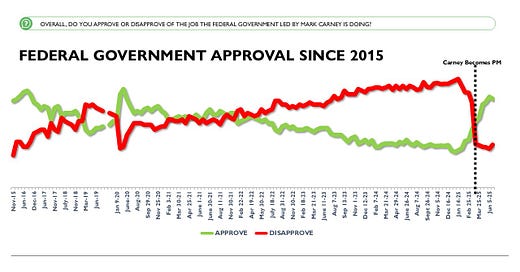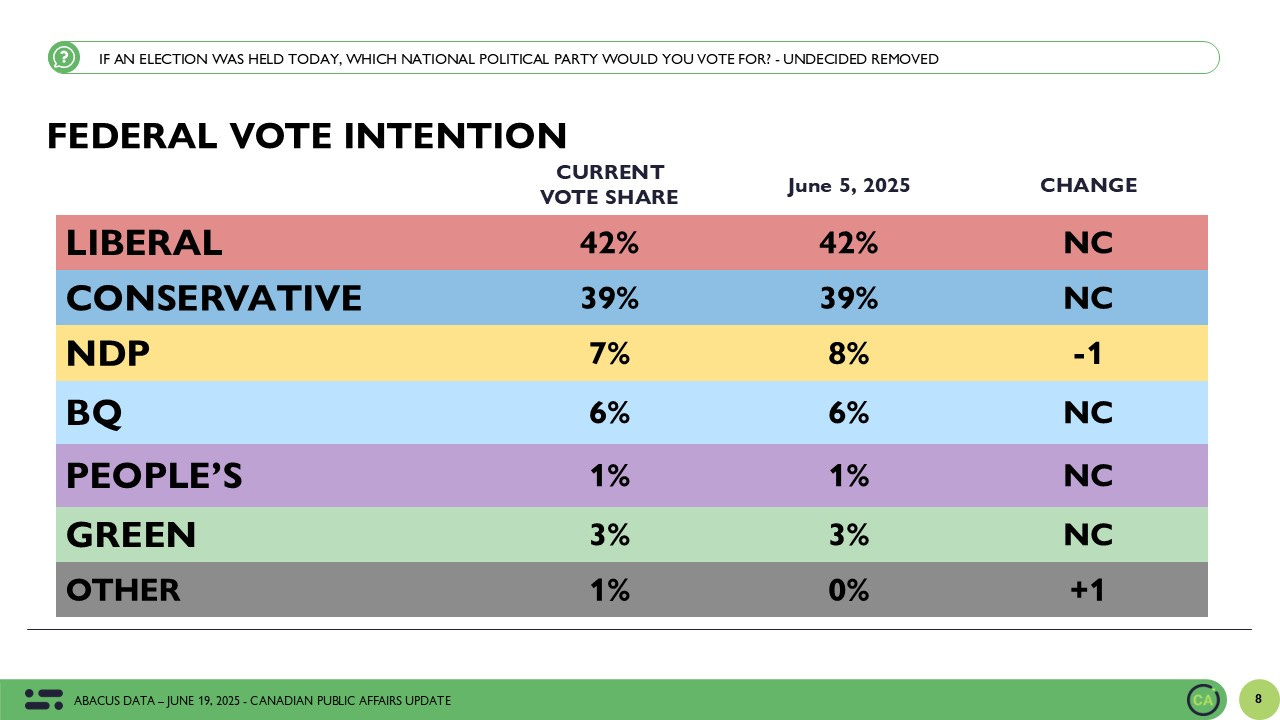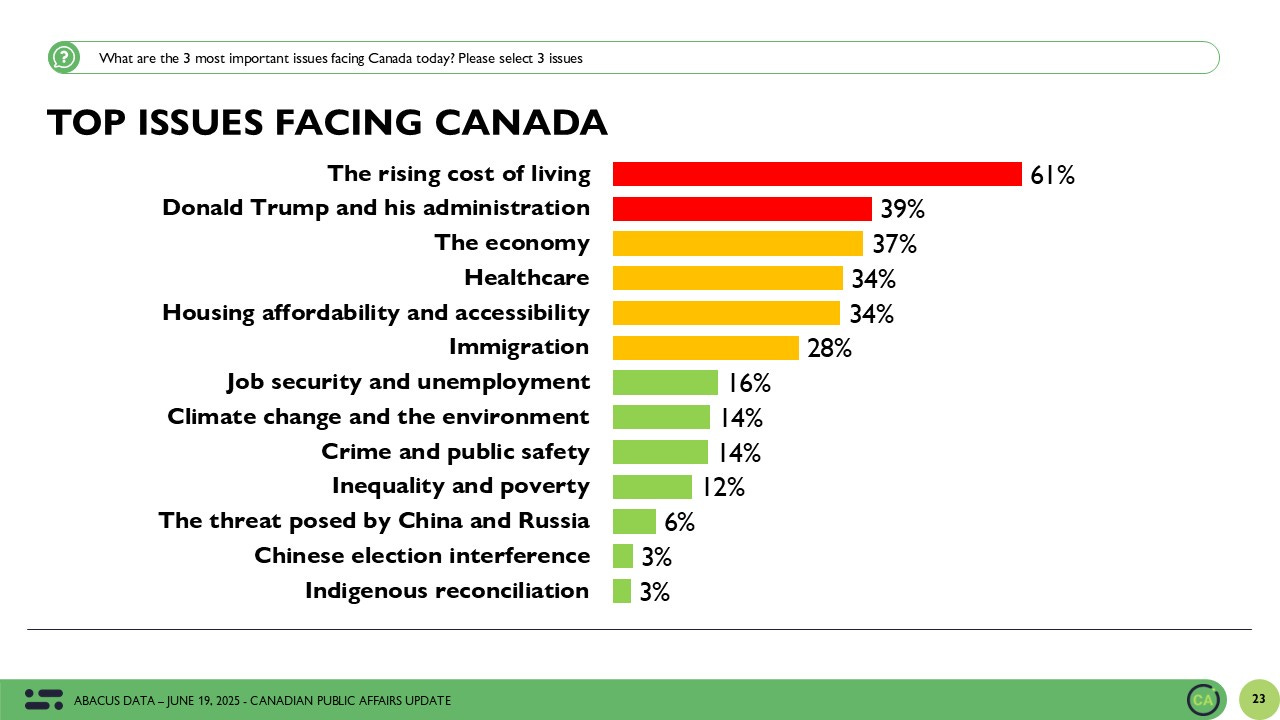52% think Carney government off to a good start. 28% disagree
The latest Abacus Data polling on Canadian politics
We’ve just completed our latest national survey on Canadian politics, conducted before the House of Commons passed Bill C-5. And while not much has shifted since our last wave earlier this month, that in itself tells us something important: the political environment is holding steady. Canadians are not tuning out, but they’re also not panicking. They’re watching.
Support for the Carney government remains strong, though slightly softer than earlier this month. Just over half of Canadians (52%) approve of the job the federal government is doing, while 25% disapprove. That’s a drop of one point in approval and a slight increase in disapproval, but overall, these are still high marks. Especially when compared to the sustained negatives Justin Trudeau faced for much of his final years in office. So far, Carney’s honeymoon continues.
Carney himself remains one of the most popular figures in Canadian politics. His net favourability stands at +19, with 48% of Canadians saying they have a positive impression of him and 29% negative. His positive numbers are down slightly - by three points - while his negatives are up two, but this doesn’t signal anything more than a settling-in effect. He remains a considerable asset to the government, particularly when compared to Trudeau’s post-election standing in 2021 or 2019. People are still rooting for Carney to succeed.
We tested a new question this wave: do Canadians think the Carney government is off to a good start? Just over half - 52% - say yes. Only 28% think it’s off to a bad one. In Quebec, Ontario, and BC, a clear majority feel positive about the government's early performance. Notably, one in five Conservative voters say the Carney government is off to a good start. And among Liberal voters, that number jumps to 90%.
But this goodwill hasn’t translated into a broader advantage for the Liberals in the horserace. The numbers remain essentially unchanged. The Liberals lead by three: 42% would vote Liberal, 39% Conservative, with the NDP languishing at 7%. This suggests that while the Carney government has made a strong first impression, it hasn’t yet expanded the Liberal base or eaten into the Conservative coalition.
In fact, when we look at the accessible voter pools—the number of people open to voting for each party—we find the Liberals and Conservatives are tied at 53%. That’s rare. Typically, the Liberals have a structural advantage here. So while Carney is personally popular and the government is getting high marks, Poilievre’s support has not collapsed.
Which brings us to Poilievre. There’s been a lot of discussion lately about whether he’s in trouble, but our data shows no clear evidence of that. He’s holding steady. His personal image is evenly split: 41% positive, 41% negative. That’s unchanged from earlier this month. And it’s worth noting that this is a stronger position than Andrew Scheer or Erin O’Toole had after their election losses. Poilievre remains polarizing, but he still has room to grow and the Liberals shouldn’t be complacent in thinking he’s easily beatable.
When it comes to the issues that matter most to Canadians, not much has changed either. The cost of living remains the dominant issue—61% of Canadians select it as one of their top three. Donald Trump is second at 39%, followed by the economy, healthcare, and housing. Immigration ranks just below that, while climate change remains relatively low at 14%. Despite record wildfires and rising temperatures, the salience of climate change has not increased. It’s another reminder that, for most Canadians, the economy and affordability are their day-to-day priorities.
We also continue to track which party voters believe is best equipped to handle these issues. The Conservatives lead on the cost of living by 9 points, on housing by 4, and on crime and public safety by a commanding 27 points. They also lead by 7 on the economy. The Liberals have a 6-point lead on healthcare, and a massive 45-point advantage on dealing with Donald Trump - among the 39% of Canadians who put Trump in their top three issues. On climate, the Liberals are just ahead of the Greens. These patterns reinforce that both parties have their issue strengths, but that those strengths are split across different voter groups.
We also asked whether Canadians feel that the April election result gave Mark Carney a mandate to radically change Canada. On this question, Canadians are divided: 30% say yes, 32% say no, and 37% are in the middle. Among Liberal voters, 46% believe he has a mandate for major change, while 19% disagree. That means a significant number of voters—even within the Liberal coalition—are waiting to see what kind of change Carney will pursue and whether it aligns with their expectations. It’s support with conditions.
Demographically, the electoral coalitions remain where we’ve seen them in recent months. The Liberals lead among voters over 44, while the Conservatives are ahead among those under 45. The Liberals lead by six points among women, while the two parties are tied among men. Interestingly, the Liberals continue to lead among men over 60 but trail among men under 30. Education remains a key dividing line: the Liberals lead by 20 among university graduates, while the Conservatives lead among Canadians with high school or college education. These divisions have hardened since the election and continue to define the political landscape.
So what does it all mean? The Carney government continues to benefit from a reservoir of goodwill, but that support hasn’t yet broken the political deadlock. Canadians aren’t rushing to change their minds. They’re holding on to their initial impressions, watching to see whether the promises made in April turn into meaningful progress.
In other words, we’re in a moment of pause. The Liberal coalition is holding, the Conservative coalition remains intact, and Canadians - by and large - are giving the new government time to prove itself.








David, I am quite surprised at the divergence between your poll and Nik's (Nanos). The way I see things, the Liberal government is putting forward a lot of Conservative policies. So you could like Mr. Carney for that, or hate him because he is stealing the political ideas you tried to promote.